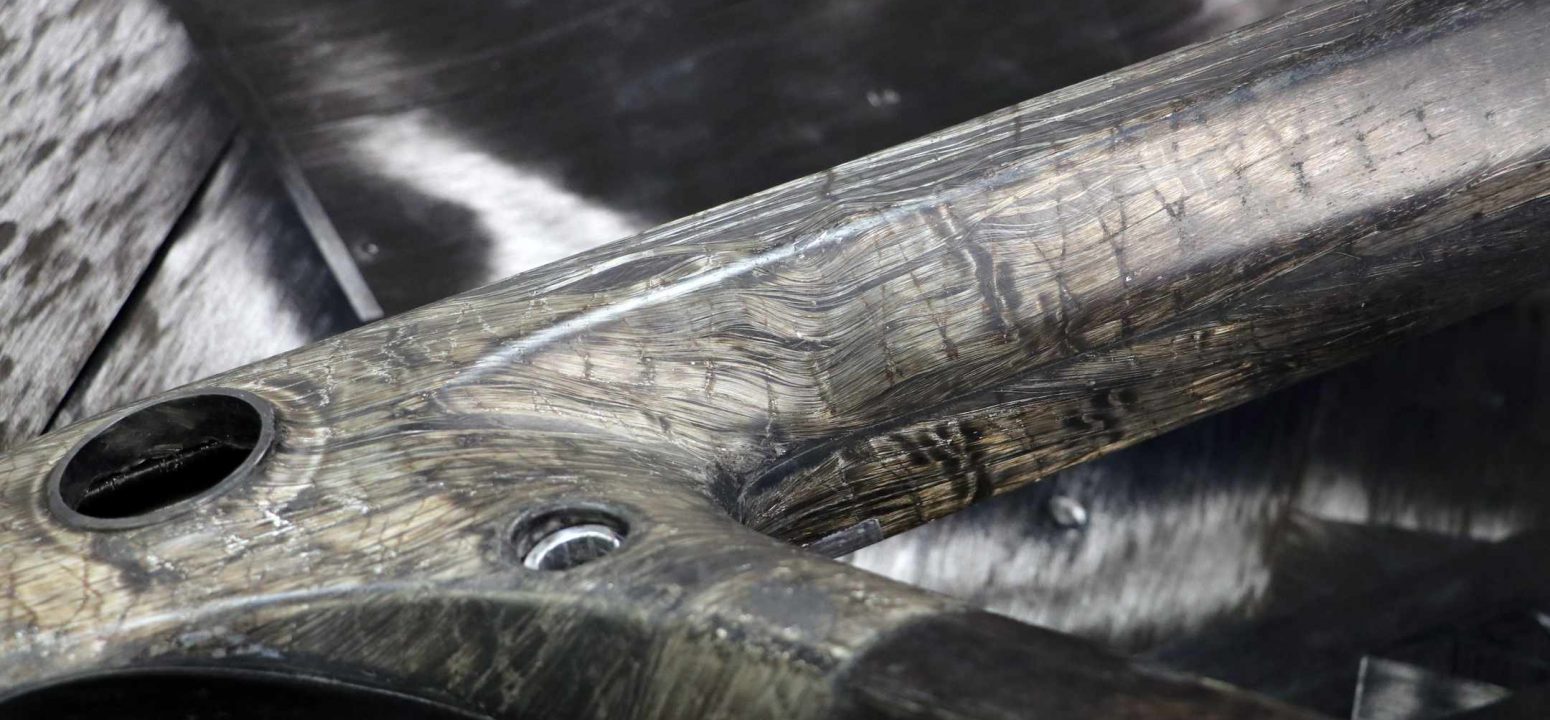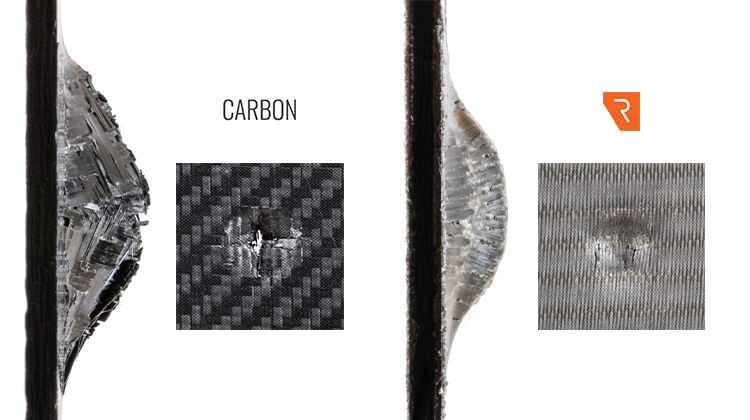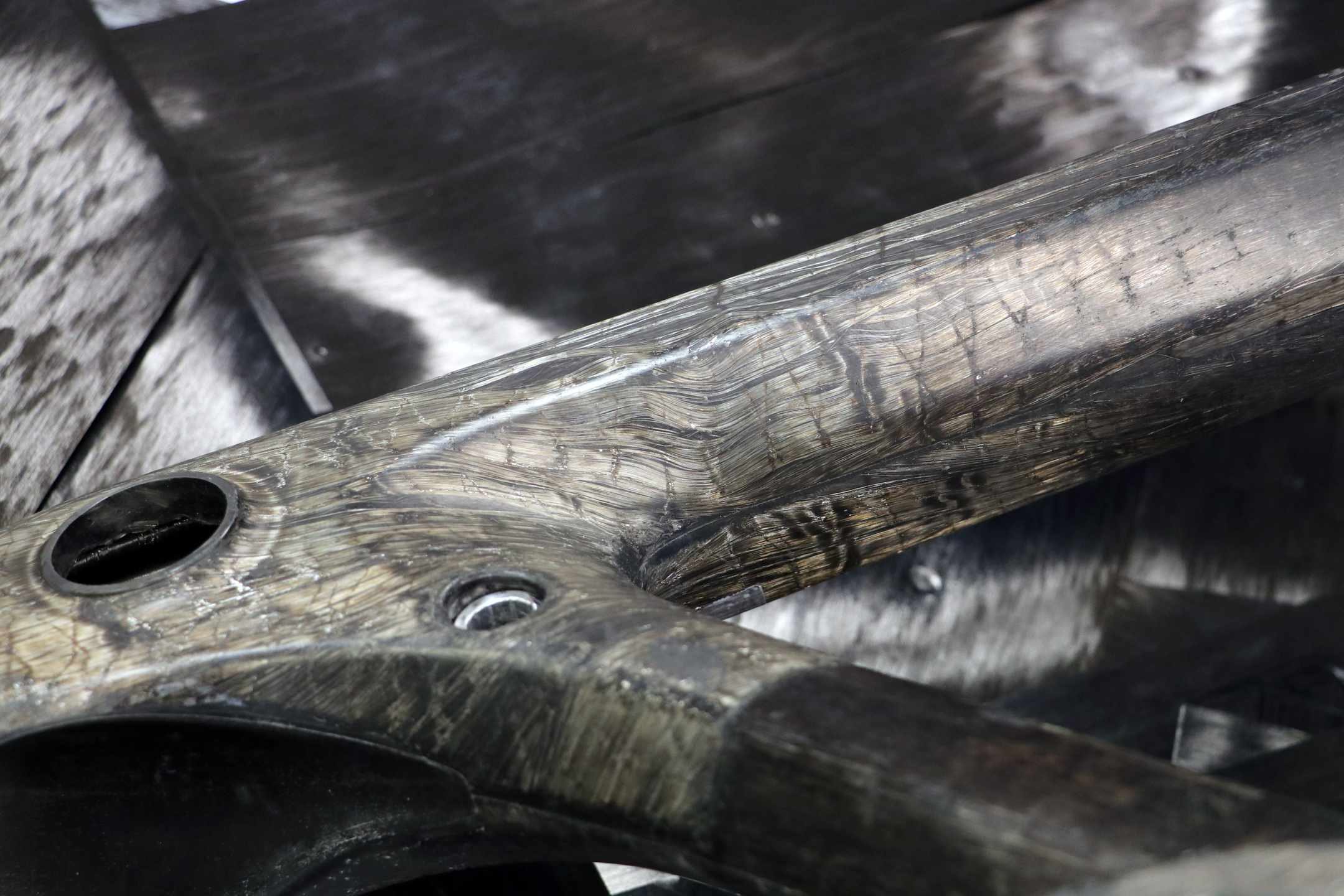Accell Group, makers of brands including Lapierre, Ghost, Haibike and Raleigh, is joining forces with a company called REIN4CED. This enables them to shift some production to a new Belgian facility and accessing a new automated carbon fibre technology. Here’s why we think this isn’t just another boring press release and you should be interested.
Feather: New Carbon Fibre and Steel Technology
The facility uses what REIN4CED calls ‘Feather technology’. This incorporates a small amount of steel into the carbon construction, keeping the weight down, but apparently adding a level of impact resistance. Handy for rock strikes… This image from the REIN4CED website shows the claimed difference in the behaviour of standard carbon and Feather technology. Further information on how this works and is created is thin on the ground, but count us intrigued.
Automated Production
Traditional carbon manufacture uses people to lay up the layers of carbon. As we learnt on our tour of the Hope factory, it can be hard to find people with the right skills to deliver the quality needed – and they work at the pace of a human, subject to things like getting ill, or needing to sleep. All of that can limit production times – REIN4CED says it expects to be able to produce 20,000 frames a year at the new facility. If automated carbon manufacture lies in our future, that’s going to be a huge shift for the bike industry workforce – particularly in the Far East.
European Production
Following a trend we’re seeing emerge in the bike industry, the Far East is no longer the only place to cost effectively build bikes. Accell anticipates reduced delivery times, storage and shipping costs. As fuel prices rise, shipping round the world is becoming less cost effective – and the environmental cost is becoming a commercial factor as well as a moral one. As with other manufacturers we’ve seen shifting their construction to premises closer to home, Accell believes the new facility will reduce the environmental cost as well as the financial.
Read the press release in full here:
Accell Group shifts to automated production of carbon fiber bicycle frames in Belgium
Collaboration with Leuven based innovator REIN4CED
January 16th 2020 – Today Accell Group and REIN4CED announced their collaboration on the automated production of high-end carbon fiber bicycle frames for Accell. Mid 2020 the first hardtail mountain bikes with the new technology for Accell’s brand Ghost will be available in Germany, Spain, Austria, Switzerland, Italy and Czech. REIN4CED set up a brand new automated manufacturing facility in Belgium. With the production shift from Asia to Belgium, Accell benefits from significant logistic and sustainability advantages as well as increased supply chain flexibility and efficiency. Local manufacturing in Europe drastically reduces overseas shipments and storage, resulting in a positive contribution to CO2 emission, faster deliveries and cost savings.
CEO Accell Group Ton Anbeek: “This collaboration matches Accell Group’s global innovation strategy and ambition to increase sustainability in its products. With enhanced durability and safety through local production and maximum performance for our cyclists with the new FEATHER technology. In two words: this innovation is smart and green”.
Detail of pre-production prototype Ghost frame
CEO REIN4CED Michaël Callens: “Accell Group is a world leader and pioneer in the bicycle industry and we are proud to work together. REIN4CED developed a new, automated production line for hybrid composite bicycle frames in its production facility in Leuven, Belgium, with an annual production capacity of up to 20.000 frames. Accell and its consumers will benefit from our product as the new FEATHER composite material offers extreme impact resistance. Our hybrid carbon-and-steel fiber composite will deliver the confidence that cyclists deserve in high-end composite bicycle frames. The FEATHER material combines the stiffness and lightweight characteristics of carbon with the toughness of steel”.
Comments (8)
Leave Reply
Post Comment





“sustainability advantages”. mmm.
It’s still a un-recyclable carbon frame. I know all frame materials have their issues but lets not pretend they are anything but a bit shit for the environment.
And yes I have a carbon bike and I am a hypocrite.
Nothing about how the supposed cost cutting in manufacturing and shipping will impact the end user, the rider, cheaper frames / bikes?
They say “sustainability advantages” they then follow with “Local manufacturing in Europe drastically reduces overseas shipments and storage, resulting in a positive contribution to CO2 emission” so its in that area that they claim the “sustainability advantages” not in the material.
As for cost cutting being passed on to the end user it seems its very new technology so who knows.
Overall perhaps lets not be to down on it as its only these sort of continual developments that have led us to the fantastic bikes we have today (and the even better bikes of tomorrow)
Agree with the above folks – ‘environmental’ argument put forward is being nothing more than sales BS using this year’s go-to cliche. Saving the environment ? My Bhollox.
If the industry wants to do something good for the environment it can start by not changing standards every 5 minutes that make the last product obsolete and ends up scrapped way before it’s broken or worn out.
One glimmer of hope ? Finally the carbon makers starting to accept what people have been saying for a decade – carbon can be shiiite at dealing with impacts.
Lets face it , if you all want to take the environment seriously you should give up mountain biking altogether as its all only degrees of not being friendly to the environment
Hi guys, Sam from Feather here, we are the company making the material and building the bikes. I wanted to jump in on this discussion to thank you for your input and to maybe provide some answers. 🙂
Our Feather material is super lightweight and durable and can more easily be re-used than the classic carbon used for bike frames. The impact on the environment is reduced by the reduction in shipping from Asia as well. Due to the fact that our carbon is more durable, riders will be able to enjoy their bikes for a longer period of time, even after rock strikes.
Check us out on https://www.feather.eu/ or follow along on our socials. We would be delighted to get your feedback!
Good to hear Sam.
“Due to the fact that our carbon is more durable, riders will be able to enjoy their bikes for a longer period of time, even after rock strikes.”
So 10 year transferable warranty on frames then?
oh the negativity…. I’m sure we would all be happy to have had no progress and be riding around on bikes from the 80’s or 90’s – its stuff like this that has given us the current almost unbelievable rocket ships many of us ride – dont forget that.